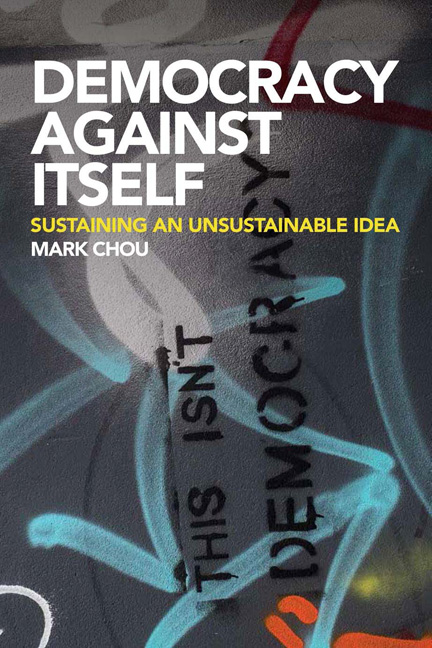Book contents
- Frontmatter
- Contents
- Introduction
- 1 Democracy Against Itself
- 2 Democracy in Athens: Autonomy, Tragedy and Decline
- 3 Democide in Weimar: Militant Democracy and the Paradox of Self-Defence
- 4 The Coming Authoritarianism: The State of America's Democracy
- 5 China's New Authoritarianism: A Glimpse at Our Post- Democratic Future?
- 6 Occupy Democracy: Democracy Against Itself and the Global Occupy Movement
- Bibliography
- Index
3 - Democide in Weimar: Militant Democracy and the Paradox of Self-Defence
Published online by Cambridge University Press: 07 December 2017
- Frontmatter
- Contents
- Introduction
- 1 Democracy Against Itself
- 2 Democracy in Athens: Autonomy, Tragedy and Decline
- 3 Democide in Weimar: Militant Democracy and the Paradox of Self-Defence
- 4 The Coming Authoritarianism: The State of America's Democracy
- 5 China's New Authoritarianism: A Glimpse at Our Post- Democratic Future?
- 6 Occupy Democracy: Democracy Against Itself and the Global Occupy Movement
- Bibliography
- Index
Summary
Athens is important. Yet instances where democracies have acted against themselves are not limited solely to the antique past. If anything, the reverse seems true. As a form of political governance which largely fell out of favour following the failed Athenian experiment, democracy only became politically appealing again as a consequence of the European Enlightenment. The idea that each individual should have the capacity to determine their own fate and have a hand in governing themselves found favour with the new Enlightenment principles of autonomy, rationality and equality during the seventeenth and eighteenth centuries. Since that time, democracy's appeal has continually increased. Now, as one scholar recently noted, democracy is ‘one of the few stable features in a rapidly changing world’. But the paradox, or consequence, accompanying democracy's global rise during the past century has been a corresponding collapse: one which saw a great many of the world's newly established democracies falter and return to their former authoritarian ways. Though these democracies shared few similarities with their Athenian ancestor, they did suffer similar fates. In this respect, Athens was merely an ancient precursor in the greater scheme of things. Fast forward to our own age, roughly to the period between the First and Second World Wars, and there we can find another raft of modern democracies acting against themselves.
What quickly becomes apparent when examining these so-called interwar democracies, as a number of commentators have pointed out, is just how rapidly the wave of democratisation subsided and transformed into a destabilising riptide that undermined the capacity of these fledgling democracies to consolidate. ‘There are no heroic tales to tell about world democracies between 1933 and 1939’, as Alexander Groth writes. ‘There are not even encouraging ones during that period.’ For Nancy Bermeo, it may therefore be true that the ‘interwar years were a watershed for democracy and for demo cratic theory’. But it was also true that of the twenty-six European democracies which existed in 1920, half would, by 1938, become dictatorships. This is why, as Ian Kershaw explains, ‘[t]he collapse of democracy and establishment of authoritarian systems of rule was no rare occurrence in interwar Europe.
- Type
- Chapter
- Information
- Democracy Against ItselfSustaining an Unsustainable Idea, pp. 50 - 76Publisher: Edinburgh University PressPrint publication year: 2014



